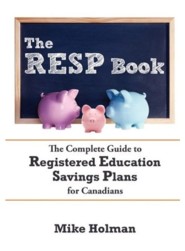The post is part of the Baby Expenses Series. See the entire series here.
See all RESP posts here.

RESP – Registered Education Savings Plan.
RESP is a type of investment account in which all income and growth are tax sheltered until the time of withdrawal and there are government grants which equal 20% of the contributions.
One bit of advice is not to worry about contributing to an resp right away unless you are on solid financial ground. Make sure your own finances are secure before you start saving for a future uncertain cost. I’ve found that opening an account does allow relatives (read grandparents) a great avenue for gifts so that’s one reason not to wait too long.
Basic rules:
You have up to 18 grant contribution years starting in the year where your child is born or 1998 whichever is later. The last year you can get a grant is the year when they turn 17. Each of those years, the child accrues $2500 of eligible “contribution room” which means they will receive the 20% CESG grant. In any given year, they can get a maximum grant of $1000. For example if a child is born in 2007 and the parents start the resp in 2008, they can contribute $5000 right away and get $1000 in grants. Lower income families are eligible for more grants as well.
When the money is withdrawn by the student, the original contributions are tax free (since they were already taxed) and the growth and income portion is taxed in the hands of the student. If the child does not go to school then the subscriber of the account can collapse the account and get the original contributions returned tax free and the growth and income portion will be taxed at their marginal tax rate + 20%. In that case the grants will be returned to the government. One thing to keep in mind is that the resp doesn’t have to be collapsed until the 26th year so even if you know the kid isn’t going to school you can delay the collapse and hopefully time it with retirement which would really cut down the tax bill.
I think these plans are a great way to save for your child’s education because of the government grants as well as the fact that no taxes will be paid on the account until withdrawal – and even then the growth portion of the account will be taxed in the hands of the student, not the subscriber. There is the risk that the child will not go to school which would be a problem because of the taxes involved. However I’d say that one way to look at it is to think about how much money you will get back from the resp if the child goes to school (zero) and how much you’ll get back if they don’t go to school – not as much as if you had just invested it outside the resp but it’s still a lot more than zero.
You can set these accounts up at pretty much any bank although I think the discount brokerages are the best place for these since they give you easier access to low cost index funds. TD e-funds are the best choice for these accounts.
Asset Allocation:
I would suggest having a high component of equity in the beginning (I have 100%) and then gradually switch to be more conservative over the years. I would think by the time the child is about 14, the account should be mostly money market or short term bonds.
Warning – Don’t buy into group pooled plans since they are not a very good deal. If you are already in one then don’t worry about it, it’s not worth changing.